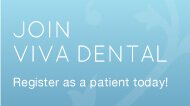When To Change Your Toothbrush & Why
We want to make caring for your smile simple and straightforward, so everyone can have the healthy, bright and strong teeth they deserve. That’s why our dentists regularly post on topics relating to dental health – the most important aspect of your mouth, teeth and gums.
Today, we’re looking at the noble toothbrush. But what type should you use, when should you change it and how do you know when it’s time? Well, read on to find all the answers here from our Lancaster dentists.
What type of toothbrush do you recommend?
Everyone’s smile is unique, and what works for one person may not work for another. Having said that, we can happily highlight some truths and myths about toothbrushes.
First of all, a softer brush isn’t less effective than a harder one. In fact, it can be better for your smile – because over time, harder brushes can wear away the protective enamel layer on your teeth. We usually only recommend hard-bristled toothbrushes to those with staining, who may not benefit from teeth whitening.
Second of all, it’s entirely up to you whether you choose a manual or battery-powered toothbrush. However, research shows that electric toothbrushes may be more effective. Thanks to disposable heads, they’ve become more affordable too, and there’s no denying that they can reach places manual brushes can’t, thanks to their oscillating heads.
When do I need to change my toothbrush?
Now the big question: when to change your toothbrush. Well, our dentists here in Lancaster recommend every 3 months. That’s 4 toothbrushes a year. Having said that, there are some warning signs that you might need to change a little earlier. These include frayed or splayed bristles, or bristles that have lost their stiffness.
With young children, always supervise brushing. Some are prone to chewing on the brush head or rubbing their toothbrush on other surfaces, which can cause damage and pick up bacteria.
What happens if I don’t change my toothbrush as recommended?
Once its bristles become worn, your toothbrush isn’t as effective at removing bacteria and plaque. In addition, it’s possible that you could cause an infection by continuing to use an older brush. Finally, if anyone in your house is ill, or has used your brush by mistake, it’s a good idea to get a new one.
When do I need to brush my teeth?
Two minutes, twice a day is the general rule of thumb, but if you wear braces such as Invisalign, you’ll need to brush your teeth each time you’ve eaten (before popping them back in). It’s also advised to brush your teeth if you’ve eaten a particularly sugary snack.
What else do I need to know?
Tooth loss is often derived from poor hygiene practices, which makes it so important to brush and floss as recommended. In the case of missing teeth, you may need dentures or dental implants to restore the function and appearance of your smile; thankfully, our dental practice is trained in both.
How do I book with you?
For a hygiene appointment or to arrange a consultation for a treatment such as dentures or dental implants, get in touch with us here in Lancaster today, and we’ll arrange an appointment to suit you.





